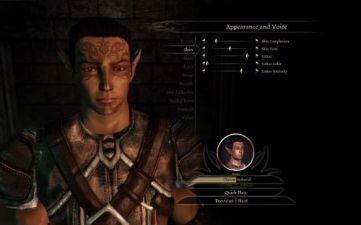When talking about good characters in any medium, there are many different aspects that come into play to create a living, breathing experience for the audience. This is not different for games, and while I could talk about characters all day, it seems like a disservice to take only small aspects of characters and present them one at a time. For instance, we’ve talked before about the importance of having a good avatar in a game, had lively discussions about representation in our avatars and NPCs, and even dabbled in how games can help us explore experiences outside of ourselves from time to time by giving us a main character or avatar that is outside what is typically expected in a game.

But what are avatars, really? Are they different from characters? And, if they are, do these differences influence how we play?
Avatars and Characters
An avatar is the physical representation/manifestation of the player in the game-world. This sort of identification “as” a character means that you are inserting yourself into the blanks left by the writiers. The avatar embodies the way you want to be seen in the game-world either physically, mentally, or both, and lets the player interact with the world in a way that is meaningful and personal, because the avatar – in this case – is the player. And avatar is, for all intents and purposes, a new skin players walk around in within the game’s world.

A character, on the other hand, is a tool for the player to use within the game to manipulate the game’s world. When identifying “with” a character in this way, the player is given a developed character and asked to empathize with him/her. Even if a game has RPG elements, like in The Witcher 3 or the Mass Effect series, and allows the players a certain amount of flexibility in how the character develops, at the end of the day the character has a fairly pre-determined personality. A character, by this definition, is an aesthetically pleasing cursor, used as a tool to interact with the game.

However, the lines between these two can be blurred, and at times players can subconsciously choose whether a person in a game is a character or an avatar, based on their goals as a player and what they want to get out of their experience, which we’ll talk a little more about below.
Established Characters
When playing as an established character, the player is essentially stepping into someone else’s story and walking around in it for a while. The character has a personality, but it usually doesn’t manifest during the actual gameplay. Examples of this would be Solid Snake from the Metal Gear Solid series, or Cloud from Final Fantasy VII. Both have distinct personalities, but those personalities don’t matter during actual gameplay. In these instances, they are aesthetically-pleasing cursors, used as a tool with which the player interacts with the game world.
However, some characters, like Geralt from The Witcher series, Commander Shepard from Mass Effect, and Hawke or the Inquisitor from Dragon Age would be partly established characters, but also begin to fill the role of avatars.

They have fairly established characters, backstories, etc., but building their personality is part of gameplay, and their personality affects the game. This begins to give the player more autonomy within the fictional world, and therefore better enables the player to insert him or herself into the world, rather than simply using the character as a tool.
“Blank Slate” or Build-Your-Own Avatars
The examples of Shepard, Hawke, and Geralt are examples that begin to blur the line between a character and an avatar. So, an avatar – or “blank slate character,” lets players put themselves – or a certain iteration of themselves – into a video game.
This is where things become interesting. While players can certainly role-play a game as themselves, players can also experiment with different personalities and characteristics. They can accentuate a strength or a flaw, change their appearance and background, and literally “get into” another person’s skin and walk around in it for a while.

The avatar, though, is you, or how you want to be seen in the game world. This is easily exemplified in an online game like World of Warcraft, where your avatar is a visual representation of you, much like your physical form in the physical world is a visual representation of you, but this could be applied to any game that allowed you to build a character in your own image, or one that allows you to fully project yourself onto him/her.
Another Person’s Shoes
Playing as either one of these types of characters can allow players to experiment with different genders and experiences… After all, when else can you be a man pretending to be a woman, while flirting with men who are played by women? In the case of an avatar, it may encourage the player to truly role-play as that type of person, or, in the case of online games, may result in them being treated differently based on their appearance. If, however, a person decides to play as an established character, the player will naturally be looking at the world from that character’s perspective, due to the wonderful power of empathy.

By playing as a character different from yourself, gamers can experience a bit of another person’s life. As we’ve talked about before, our brains don’t differentiate between real and virtual experiences – if we experience or learn something within a game, our brain will generally treat it like it was experienced or learned outside of a game. and increase your empathy. After all, a woman playing as Solid Snake will have a slightly different experience than a man playing as the same character, and vice versa for a character like Bayonetta. The more types of characters you experience, the more insight into them you may have, and the more empathetic you may become to their way of existence.
Only if you’re aware of it, though.
Enter the Avatar: Tactical Maneuvers
Why might people choose to experience the game through the eyes of a different type of person, though? It comes down to what you want out of the game: do you primarily strive for experiences, or achievements?

If you look for new experiences in a video game (even if it’s only sometimes), then the above portion of this article applies to you. It’s possible that you as a player are interested in experiencing what people not like you experience, and so – when given the option – may choose to play as a character of a different race, gender, or even species, just to experience the world through someone else’s eyes.
But playing as someone not like you can be tactical, as well. This means that the player has put a great distance between themselves and the character on the screen. The character/avatar is nothing more than a pretty cursor and a stats screen. While the player experiences the game world through the character/avatar’s eyes – the player is limited by what the character can do in the game world/how responsive the character is to the buttons on the controller – and the player is limited to interacting with the game world by using the avatar, at the end of the day, the character/avatar is used simply for tactical purposes.
For instance, a man may choose to play as a female character in an online game in order to encourage people to be nicer to them and help them (in an MMO). In an online shooter, a man might play as a woman because people (still) don’t always expect women to be good at playing video games, and so “being a woman” might give them an element of surprise. Likewise, a woman may play as a man in order to reap the benefits of being seen as a man in an online community. They may be taken more seriously, or be left alone more.

Another, less socially-charged, example of picking a character would be choosing a fighter in a tournament. For instance, a man might play as Chun-Li, not because he wants to experience a game as a woman, but because he thinks she has powerful combos or anticipates another tactical benefit. In all these instances, the players are more focused on tactical aspects of their characters/avatars, rather than the personal, emotional, or empathetic experience they will have from playing a game.

Cursor or Character?
Both of these experiences are valid, and at some point or another, most gamers have probably played a game using an avatar in addition to playing a game(s) that have an established character as the playable character. Of course, tactical usage is nice, and knowing when to choose which character can have fantastic in-game benefits. Being aware of when you are projecting onto a character and when you are – for the most part – using the character as a tool to interact with the world can also result in powerful gaming experiences, and increase a player’s capacity to relate to another person after experiencing the world through their eyes.
Have you ever felt like you were one of your avatars in a game? Did it force you to think critically about anything? Or do you prefer a little more distance between you and your characters? Let me know in the comments!
Thanks for stopping by, and I’ll see you soon!
~ Athena
**This article has some extra content available over at Patreon, if you are so inclined!**
What’s next? You can like and subscribe if you like what you’ve seen!
You can also:
– Support us on Patreon, become a revered Aegis of AmbiGaming, and access extra content!
– Say hello on Facebook, Twitter, and even Google+!
– Check out our Let’s Plays if you’re really adventurous!


I prefer to have some distance from my avatar with the exception of the souls series. Playing from a guy’s perspective can be very amusing. Even more amusing, is when I’m playing an avatar that could change its gender in mid game (Dragon’s Dogma). 😀
LikeLiked by 2 people
Hey, there are real people who change genders, so why can’t a video game character do the same thing, right?
It can be amusing to play as a different gender! What is it about the souls series that makes you want to have a “closer” relationship with your character/avatar?
LikeLiked by 1 person
Yes you are right. Someone told me that sexuality is not black and white. I think that game in particular was tampering with sexuality.
I think some souls fans battled with some sort real life obstacles we want to overcome. I believed I can beat the game as myself just like in the real world ! 🙂
LikeLiked by 1 person
Ah, I see. That’s really great, and I’m glad you were able to forge that kind of relationship with your character because of your own personal experiences.
LikeLike
Another excellent, analytical gem 🙂
I’ve always felt it was awkward to pretend/put myself in the mind of the character, but it opens up a lot of interesting, “brainy pathways”. Currently I’m playing as a selfish, cold-blooded killer who would put Jack The Ripper to shame. I suddenly caught myself planning to murder everyone in Diamond City without anyone noticing, before realizing what kind of maniacal thing to do that is. Hoist the red flags..
LikeLiked by 1 person
Thank you so much! 🙂 Well, video games are definitely a way to experiment with actions that you wouldn’t take in real life, so you won’t get any judgment from me as long as it all stays in the virtual world! (haha). It can be a bit of mental gymnastics to really try to put yourself into the brain of the character, but I guess I’m just one of those weird people who loves trying on different types of lives!
LikeLiked by 1 person
Yeah, they probably won’t let me play games in jail.
I find it harder to “get into” a character I didn’t make myself. That combined with the newfound bloodlust. Is that lack of empathy or sympathy?
LikeLiked by 1 person
…no, probably not.
Haha I’m not sure if it’s a “lack” of anything or not, but what you’re talking about is empathy, or the ability to relate to other people 🙂
LikeLiked by 1 person
Whew.. Was afraid I was going down a slippery slope there
LikeLiked by 1 person
For games where I create an avatar, i haven’t had that type of experience where i see the world and experience things from their perspective. Simply because as you said, most avatars are limited by how you can interact with the world. If there is a genre that would let this type of avatar interacton/immersion shine it would be MMOs, simply because of the social factor. As long as everyone is doing it, I suppose role playing really makes this possible. But in my experience, my friends and I usually break the 4th wall.
I prefer something in between, like Geralt or Sheppard, where they have established traits, but you have a degree of control of what they do through the game play. So it helps me see things from their view at times, but also give my own input from time to time. I like this mostly.
LikeLiked by 2 people
Yeah I think MMOs are the easiest game to have an avatar that *is* you in the game world, because (as far as I can tell) the players really are playing as themselves, or as a person they’d like to be. There are some social experiments that have used MMOs for data, and it’s really fascinating to see a culture emerge from all these real people who are pretending to be elves and orcs and whatnot.
I tend to like the in-between characters, as well. I have enough imagination to project pretty hard onto characters, and, for me, I feel a little safer knowing that there are some boundaries as to how much “me” is out there. It also really lets me get into another person’s head/way of living, which I really enjoy but, like you said, its within a space where I can still have a little bit of say in how the game plays out.
LikeLiked by 1 person
“After all, when else can you be a man pretending to be a woman, while flirting with men who are played by women?” Thursdays. That’s when.
When given the ability to make my own avatar, I tend to mix it up a lot. Aside from when I’m deliberately trying to insert myself into the game, which is admittedly often because I love being me, I vary a lot in terms of gender, ethnicity, etc. If I were apt to analyze myself, I might be given to wonder why I do that, but best I can guess right now is that I just like different looks.
LikeLiked by 2 people
Your Thursdays sound amazing.
…and I’m totally jealous.
That’s interesting. I remember you mentioned a while ago about playing as femShep in Mass Effect, so I think that’s really cool that you change it up and have a lot of variation in your characters’ appearances. Do you find that your game experience is different, compared to when you role play as yourself? I don’t mean to get too personal, but I actually was thinking of talking about that in another article, so I’d love your input if you’d be willing to share!
LikeLiked by 2 people
Sometimes, it’s different. I’ll say generally it’s easier to step into my character’s shoes when I’m making them with the idea that ‘this is me’ from the start, but it depends on how the game treats it. If I’m not given the tools to interact on a deeper level, which reasonable dialogue options seems to be the key for, I’ll still find a bit of distance between myself and my self-insert. At the same time, I can still step into character if a game is really engrossing me with an avatar I created, but it’s exactly that, projecting a character rather than putting myself in. It’s kind of a subtle difference, but it’s still a difference. Like, my redheaded FemShep didn’t look a thing like me, but I still felt that was a piece of myself in there, whereas my Persona 4 character likewise doesn’t look a thing like me, but I still go in there with the idea that that’s me, so it feels closer to I myself being a part of the game.
Yeah, it’s confusing to put in words.
LikeLiked by 1 person
I think I understand what you mean. It seems like it’s still a matter of strongly empathizing with a character versus feeling like you *are* the character. Hm… Thank you for sharing your experience. I appreciate you describing the different ways you experience those types of characters!
This isn’t something that would happen in Mass Effect, but I wonder if people ever choose an avatar that is, say, a different race or gender in order to experience a little bit of that “other” person’s world. But now that I’m applying myself to this thought experiment, it seems as if that would be specific to an MMO, otherwise the player would be playing either as a character written specifically to show a different way of life (I’m thinking of a game like Mafia III or This War of Mine), or they would be playing an RPG, and, as of now, those games don’t really explore the differences between men and women because that could potentially cause too many plot deviations, if nothing else.
LikeLiked by 1 person
I almost always put myself into the characters I’m playing. Sure, there are characters that just prohibit that because they have such a strong personality with little to no way of adjusting it, due to narrative and gameplay design, but if I can, I always try to play a character how I would act in that situation.
LikeLiked by 1 person
That’s really cool. I think it can be a lot of fun to try and see the world from another character’s perspective, and also to put a little of your own personality in there, as well.
LikeLiked by 1 person
When I play Mass Effect, I don’t see the character as myself. I see myself more as the character’s guardian angel. I am the hand that guides their action, keeps them safe and ultimately leads them to their destiny.
My role as guardian angel is not always benevolent. As a male playing Femshep, I find myself jealous of her love interests. As a result, Femshep rarely gets involved in serious romances. While manshep is naturally bound to the preferences of his male guardian angel.
Also, sometimes the guardian angel can be frivolous with the lives of Shepard’s associates and even whole races. The guardian angel can be subject to favouritism, which influences Shepard’s decisions. How many times has the guardian angel caused Femshep so much sorrow, just because he prefers Ashley? Too many times.
But the guardian angel doesn’t get his own way. One time he planned for manshep to end up with Ashley, only for him to choose Tali in the end. One time the guardian angel guided Femshep towards a Destroy ending, only to find it was not available.
LikeLike
You never cease to teach me new thing there, Goddess of Wisdom 🙂 Must resist urge to return to WoW… I’ve been clean since May 2015, but I really miss my Night Elf Druid and Orc Hunter 😦 Even more so now that I realize they are my avatars, haha.
*also resists urge to say many things about a certain Final Fantasy heroine* 🙂
LikeLiked by 1 person
Glad you learned something new! I aim to please 🙂 And these are pretty strict definitions of avatar and characters, so I’m sure there are other characters that are representative of “you” in a video game context. No WoW needed!! haha
*You can always say many things about any Final Fantasy characters*
LikeLiked by 1 person
Let me return the favor here, say no to WoW! (On the wagon since Burning Crusade)
LikeLiked by 2 people
Let’s make a deal. You stay away from that Marvel freemium game, and I’ll stay away from WoW.
LikeLiked by 2 people
I went ahead and deleted it last night.
LikeLiked by 1 person
What an awesome breakdown. Your posts always make me think not only about the content in terms of gaming, but also in terms of writing. Cloud (FFVII) and Solid Snake (Metal Gear) could very easily be translated into book or movie characters (and in Cloud’s case he has been a movie character) with little to no change, but with someone like Shepherd, the author or writers would have to decide whether they’d go paragon, renegade, or a combination of both. Whose gaming experience would they use to represent her? It’s more freeing, but it’s also more complicated. With characters, obviously there can be things up for interpretation, especially with a game like FFVII which has a major “what really happened” motif, but Cloud has a distinct personality that isn’t hard to grasp. Characters from WoW would have to have personalities entirely made for them in literary or visual media, because they’re blank slate, and this would be entirely up to the author/writers.
Because I’ve been thinking about cosplay, would you say cosplaying a character makes you (the cosplayer) the character’s avatar, since you are attempting to step into their skin? So if you have a legit character you’re playing, it’s kind of the opposite. If you decided to cosplay someone from WoW or D&D, you yourself are the character because they have the personality you give them. I hope this makes sense. Fascinating stuff!
LikeLiked by 1 person
Thanks! I’m glad you’re also able to take the info and apply it elsewhere – it’s always nice to hear something i wrote resonates with another person like that 🙂
You’re really hit the nail on the head about developed character personalities. It’s one of the reasons I’m a little nervous about the talk of a Mass Effect movie, and hope they never make a movie out of Dragon Age, because then there would be a “canon” main character, and that could upset a lot of people…
I love the idea of being an avatar for a character. I guess it depends if you’re actually *acting* like the character, or are just dressed as one. If you’re trying to embody them, then yes I think that could fall into a loose definition of an avatar (loose because the character isn’t directly “controlling” you, but your idea of their personality is). And I’d agree that playing as your character from WoW or D&D would just be playing a part, since your “avatar” in those games is (I’d imagine) a representation of you.
OR you could really get crazy and say that you are now physically embodying the psychological and personality characteristics you’ve created and made a reality, so you are being an avatar of *yourself.* Hm…
LikeLiked by 1 person
I wholeheartedly agree about the cosplay point. If you’re just dressed as them, then you’re just taking on the appearance of the character, but if you’re utilizing the “play” part of cosplay, then 100%. There are definitely characters I plan to “play,” where there are others I’d just like to dress as because I like their aesthetic.
Well head canons do exist and just like an actor playing a character, there’s going to be a bit of what you put into the character! Like no one will play a particular character the same way, so you’re both wearing the role and having the role wear you.
LikeLiked by 1 person